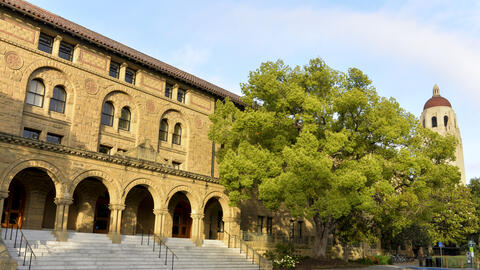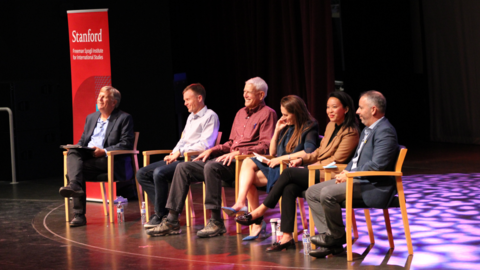About FSI

About FSI
The Freeman Spogli Institute for International Studies (FSI) is Stanford University’s hub for nonpartisan, interdisciplinary research, teaching, and policy impact in international affairs. Our mission is to produce world-class scholarship, prepare future leaders, and influence policymaking in pursuit of solutions to the most critical global issues.
At FSI, leaders with deep experience in the highest levels of government collaborate with top academic scholars and a vibrant community of students, postdocs and staff. The largest of Stanford’s policy research institutes, FSI is a trusted convener of people and ideas across disciplines, building bridges among academia, government and industry.
FSI offers a unique intellectual space at Stanford that serves as home to scholars who believe that complex global concerns require multidimensional solutions. This constellation of problem solvers cuts across traditional academic boundaries with the aim of propelling the best ideas forward for the widest possible impact. Students from across Stanford come to FSI for training and mentorship that prepares them for leadership roles as international policy decision-makers across all sectors of the workforce.
The director of the Freeman Spogli Institute for International Studies is Michael McFaul, who served as the U.S. Ambassador to the Russian Federation under President Barack Obama. He is advised by the FSI advisory council, who also serve as ambassadors for FSI and international policy research, teaching, and outreach at Stanford University.
FSI is an independent institute under Stanford's Office of the Vice Provost and Dean of Research.
The institute's Executive Committee is comprised of the following individuals:
Colin Kahl, FSI Director
Francis Fukuyama
Anna Grzymała-Busse
Jeff Hancock
Hongbin Li
David Lobell
Doug Owens
Scott Rozelle
Scott Sagan
Kathryn Stoner
Kiyoteru Tsutsui
Frank A Wolak
Our mission is to:
Produce world-class, worldwide research: With over 150 researchers from across Stanford’s campus and around the world, FSI is home to a diverse group of research centers and programs that pursue solutions to critical global issues.
Prepare tomorrow's leaders: Our faculty teach more than 65 classes a year, mentor dozens of honors and graduate students through guided research, and train democracy activists from around the world.
Engage policymakers: Our research flows from our home in Encina Hall to policymakers worldwide, providing data and scientific evidence for decision-making in Washington, Geneva, Beijing and beyond.
The Freeman Spogli Institute for International Studies aspires to a future where international policy decision-makers across all sectors of the workforce rely on the most rigorous research based on data and scientific evidence in order to make the world a more secure, free, sustainable and healthy place to live.
As the world continues to reshape itself around us due to the COVID-19 pandemic and other forces, FSI continues Stanford’s tradition of academic excellence by addressing the global questions of the future.
A spirit of optimism has fueled our intellectual momentum for over 30 years, marked by scholarly contributions to issues such as nuclear security, international relations, environment and energy, governance, and global health.
Our role is not only to anticipate critical problems but to prepare the next generation of leaders to solve them.
Over the next decade, we will expand our impact in the world by investing in the three core areas of our mission — research, teaching and policy.
Our Address
Encina Hall
616 Jane Stanford Way C100
Stanford University
Stanford, CA 94305-6055
General inquiries
fsi-communications@stanford.edu, (+1) 650-723-4581
Media Contact
- Ari Chasnoff, Director of Communications
Information for Donors
- Michelle Townsend - All donor/development inquiries
Student Programs
- Patrick Laboon, Academic Program Manager
Event Inquiries
- Debbie Warren, Event & Bechtel Conference Center Manager
At FSI, our areas of expertise are:
- Governance: addressing issues of democracy, dictatorship, corruption and poverty, our scholars and practitioners produce expert research and train civil society activists around the world.
- Security: We tackle a wide range of international security issues, from longstanding concerns like nuclear proliferation, regional conflict and military defense to new challenges such as cybersecurity and biosecurity.
- Global Health: In partnership with the School of Medicine, FSI brings together interdisciplinary scholars who address global health problems through the lenses of economics, nutrition, security and politics.
- International Development: FSI researchers examine international development from new and creative perspectives. Experts in education, health, governance, energy and social justice collaborate to learn how different levers of action can impact communities.
- Environment & Energy: At the intersection of physical sciences and policy, our researchers work to find solutions for hunger, environmental degradation, emerging energy markets and more.
- Regional Expertise: FSI's scholarly work spans the globe, including Gi-Wook Shin (Korea), Kathryn Stoner (Russia), and Anna Grzymala-Busse (Europe).
The security, governance, climate and development challenges around the world have never been more daunting, but our scholars have never been better positioned to understand and offer solutions. Building on a strong foundation, FSI continues to produce world-class scholarship, teach future generations of leaders and influence international policy by advancing knowledge.
Through our multidisciplinary research centers and programs, FSI has launched new initiatives on U.S.-Asia security, European security, biosecurity, the Middle East, and global governance in the areas of health and economics. All of these projects share three characteristics: collaboration among faculty from our different research centers, an interdisciplinary approach to scholarship, and a commitment to producing policy recommendations that address critical global problems.
Each year, Stanford undergraduates study with our faculty, join our research trips abroad, and intern with global policy organizations through our Global Student Fellows program.
Our graduate students include pre- and post-docs, research fellowships, and the Ford Dorsey Masters in International Policy (MIP), a two-year master's program that prepares students for professional work in international affairs. Combining multi-disciplinary analysis of the international system with exposure to current world issues, MIP provides students with the foundational skills to address global problems.
Most of the institute's activities are supported by research grants and gifts from individual and corporate donors. Of the institute's annual budget of approximately $50 million, 85 percent comes in the form of endowment income, foundation grants, contracts and gifts. The remainder is drawn from university and designated funds.
FSI actively seeks gifts from Stanford alumni and friends.
FAQs
Frequently asked questions about the Freeman Spogli Institute of International Studies at Stanford University
Our Centers
FSI is a hub for diverse internationally-focused research. Our research areas are heavily cross-disciplinary and reflect the profound interconnectedness of the challenges facing the world.
FSI at a glance
Our People
News & Research
FSI scholars offer expert analysis on contemporary global issues


